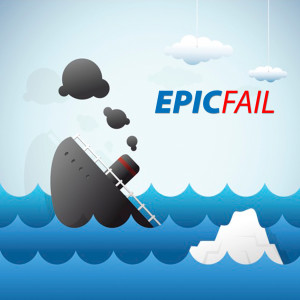A Case for Keeping It Real
Epic fail.
Literally the best.
The most amazing.
The absolute worst.
These superlative descriptions are best reserved for, respectively, the sinking of the Titanic, invention of the wheel, the Great Pyramid of Giza and the 1918 flu pandemic.
Today, it’s hard to know where you stand when something as minor as burnt toast can be considered an epic fail, or a particularly good burger becomes literally the best thing ever. An affliction of modern discourse is our penchant for exaggeration. Having been a vegetarian for seventeen years, to me there are few foods that come close to the glory that is a nice thick juicy burger. But let’s not get carried away; I’ve had ups and downs, but my life would be pretty grim if a hunk of ground beef was literally the best thing ever.
Literal and literally are intended to denote something that is true and accurate–something that has not been embellished. Water is literally wet. But words evolve in usage, and in the case of literal and literally, they are often used to intensify an overstatement, functioning opposite of their original design. Chances are that when a person says they are “literally starving,” there is no actual threat of death due to hunger.
Innovation in language usage is not a new thing. Just like the people who speak it, English has a long history of self-contradiction. A glance at the works of literary luminaries ranging from Austen to Fitzgerald to Twain reveal that they also used literally contrary to its primary definition. Everyone knows Tom Sawyer was never “literally rolling around in wealth.”
We continue to find other ways to be emphatic. With more than four and a half billion web pages (and  growing by the nanosecond), the Internet is a virtual Times Square, and superlative statements are the neon signs vying for our clicks. Hyperbole blasts us from so many headlines, with websites like BuzzFeed and their ilk boasting listicles of absolute best and worst things, from using a new toothbrush for the first time (“best thing in the world”) to receiving a voicemail (“the literal worst”).
growing by the nanosecond), the Internet is a virtual Times Square, and superlative statements are the neon signs vying for our clicks. Hyperbole blasts us from so many headlines, with websites like BuzzFeed and their ilk boasting listicles of absolute best and worst things, from using a new toothbrush for the first time (“best thing in the world”) to receiving a voicemail (“the literal worst”).
Such widespread misuse of superlatives, innocent though it may be, diminishes the power of once mighty words. Take this example: mahoosive is a portmanteau of its sufficiently powerful forebearers, massive and huge. The word was popularized in modern lingo and codified by the Oxford English Dictionary in late 2014. That the vernacular coined a term which supersedes two other superlatives suggests a trend toward excess.
In an era when English language seems hellbent on hyperbole, how do you make your writing stand out from the clamoring crowd? People have always connected with content that’s interesting, accurate and original. These traits are universal in appeal, and will persevere in their ability to capture and hold attention. There’s no need to jump on a bandwagon of the latest linguistic trends if your material resonates with your target audience.
Trust is an essential characteristic of the human condition, and your readership is much more likely to affiliate with what authentically speaks to them, rather than with exaggerated tropes. Instead of going overboard, it’s always good to keep it real.
Heather Candon is a writer living in New York.

